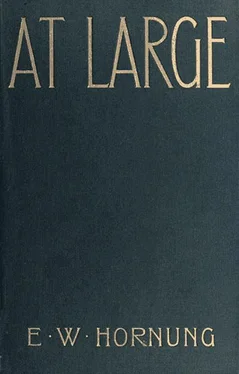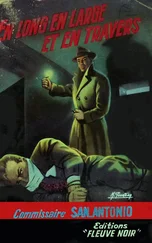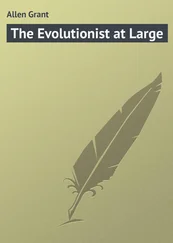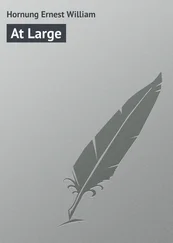E Hornung - At Large
Здесь есть возможность читать онлайн «E Hornung - At Large» весь текст электронной книги совершенно бесплатно (целиком полную версию без сокращений). В некоторых случаях можно слушать аудио, скачать через торрент в формате fb2 и присутствует краткое содержание. Жанр: Старинная литература, на английском языке. Описание произведения, (предисловие) а так же отзывы посетителей доступны на портале библиотеки ЛибКат.
- Название:At Large
- Автор:
- Жанр:
- Год:неизвестен
- ISBN:нет данных
- Рейтинг книги:3 / 5. Голосов: 1
-
Избранное:Добавить в избранное
- Отзывы:
-
Ваша оценка:
- 60
- 1
- 2
- 3
- 4
- 5
At Large: краткое содержание, описание и аннотация
Предлагаем к чтению аннотацию, описание, краткое содержание или предисловие (зависит от того, что написал сам автор книги «At Large»). Если вы не нашли необходимую информацию о книге — напишите в комментариях, мы постараемся отыскать её.
At Large — читать онлайн бесплатно полную книгу (весь текст) целиком
Ниже представлен текст книги, разбитый по страницам. Система сохранения места последней прочитанной страницы, позволяет с удобством читать онлайн бесплатно книгу «At Large», без необходимости каждый раз заново искать на чём Вы остановились. Поставьте закладку, и сможете в любой момент перейти на страницу, на которой закончили чтение.
Интервал:
Закладка:
Late one afternoon they were all three sitting in the garden, when Alice rose, without breaking her long silence, and slowly walked towards the house. The Colonel followed her with his eyes; he held a glowing cigarette between his fingers; the distance was short enough, but before Alice reached the house the cigarette was out.
"Look at her now! Is that the step of a healthy girl? See her climb those six steps—they might be the top flight of St. Paul's! Mrs. Parish"—with sudden decision—"Mrs. Parish, you must see to the root of this matter before it gets any worse. I must know exactly what is at the bottom of it. I desire you to speak to Alice, for I cannot. You understand me, I think? Very well, then, pray watch your opportunity."
The very next morning the housekeeper came to the study. She had spoken to Alice. She did not require much questioning.
"Oh, as to young Mr. Richard. I could elicit nothing—nothing at all. He seemed quite outside her thoughts."
Mrs. Parish made this statement with a smack of satisfaction. Colonel Bristo, however, must have given it a construction of his own, for he did not look displeased. He simply said:
"Well?"
"Well, she was almost as reticent about Mr. Miles; though we know what that signifies!" (But here the Colonel shook his head.) "What she did say, however, is not worth repeating."
"Still, I should like to hear it."
"It does not affect matters in the least."
"Pray go on, Mrs. Parish."
"Of course, if you insist, Colonel Bristo! Well, then, Alice tells me that, two days after Mr. Miles went, a shabby kind of woman had the impudence to walk into the garden, accost her, and ask if Mr. Miles (how she had got his name, one cannot tell) was still here. Alice said 'No,' and was weak enough to give her money, because she seemed wretched, she says, and so got rid of her."
"One of the beggars he helped," said the Colonel. "He used to have long conversations with them, and tell them to emigrate."
"Why, to be sure!" cried Mrs. Parish, at once enlightened and relieved. And now she was as eager to tell the rest as before she had been slow to speak. "The very next day after that, Alice saw a man watching the house from the tow-path. He seemed to be there all day; so at last she rowed across and asked him if he wanted anyone. He said, 'Yes, the gentleman who's been staying there; where is he?' She told him he was on his way back to Australia. The man did not seem to believe it. In the end she gave money to him too, and soon she saw him go."
"Another of his beggars!" laughed Colonel Bristo. "Their name is legion, no doubt, and we shall see more of them yet. For the credit of the Mother Country, we can't shut the door in their faces after a Colonial has given them a taste of real downright generosity. Poor Miles!"
"Well, Alice, for her part, seems ready enough to carry on his works of charity," said Mrs. Parish, adroitly, with an emphasis ever so slight on the possessive pronoun.
The Colonel smiled. Then he thanked her graciously for the service.
"I am extremely obliged to you, Mrs. Parish, for the hundredth time. You have saved me yet another interview. That is, I should have made it awkward, but you, with your usual tact, have got at precisely what I wanted. I am perfectly satisfied."
Mrs. Parish bowed. She was not a little pleased with the compliment to her tact, on which she plumed herself above everything; but her pleasure was less than her surprise—that the Colonel should be so easily satisfied! She moved with dignity to the door. As she was shutting it, the Colonel rubbed his hands and exclaimed aloud:
"It is Dick!"
The door, which was at that moment swinging to, stopped, trembled, then shut with a vicious little bang. The Colonel could make a near enough guess at the expression of the face on the other side of it. He smiled benevolently.
"Silly lady! She thinks I have turned against my friend Miles—whom, by the way, she worships on her own account. Far from it, I miss him abominably. But when it comes to a choice between him and Dick—and where my girl is concerned—why, then, I confess, I'm all for the younger man and the older suitor."
XVII
"MILES'S BEGGARS"
IRIS LODGE, during the first half of August, became for once gay, not to say festive—in a small way, as befitted a first experiment. Maurice managed to wrest his hard-earned annual holiday from the bank, and, on the very first day of the fourteen allotted him, back came Dick from abroad, bringing with him his friend Flint. After a remarkable display of obstinacy on this gentleman's part, Dick had at last prevailed upon him to leave his tenants to their own devices for one more week, and tarry by the Thames. But, though this was brought about by dint of hard persuading, in the end Mr. Flint somehow saw his way to doubling the week which at first he had grudgingly promised.
In his excuse it can only be urged that he enjoyed himself beyond expectation. The weather was very nearly faultless, the river at its best, formalities few, and the ladies—charming. The lawn-tennis court—though several inches short—was quite of the billiard-table order. The music in the evenings, though it did not run in a man's head, possessed a certain odd, mysterious, soothing, saddening, pleasing quality, that silenced one at the time, and left an impression that Miss Edmonstone could make her piano speak, if she tried. Perhaps it was classical music; very likely Chopin. Lastly—and last thing—the spirituous nightcap, though approached in a spirit of moderation, had a way of imparting the proper Eucalyptian flavour to all reminiscences of life among the gum-trees. Could there be better conditions for a pleasant visit? Flint asked himself. And if the house was the smallest he had ever stayed in, would not Castle Flint seem cheerless, vast, sepulchral, by comparison?
But indeed they were wonderfully bright and happy days: the ones on the river, when, in the bushmen's phrase, they all "camped," and Flint made tea in true bush fashion, and Dick a "damper" which no one but bushmen could eat; the afternoons at tennis, spent in wonderfully keen, if not deeply scientific, struggles; the morning at Hampton Court, when Flint owned himself completely "bushed" in the Maze, and when they were all photographed on the Green, bringing away with them the atrocious result in a gilt frame; and the day when Dick hired the four-in-hand (it created some sensation in the little road) and drove them all through Chertsey and Ascot, to Windsor, and back by Staines and Shepperton.
Certainly any outsider must have voted them a jovial, light-hearted party, without a serious care to divide among them; and even Flint, who had some power of observation, and also knew his friend thoroughly—even Flint told himself that old Dick had got back his good spirits, and was, in fact, "getting over it." But Flint did not know. Ever since their hurried interview on the 2nd of July, Dick had been as reticent as he had then been communicative of all that lay nearest his heart.
Yet never for one moment did Dick forget. He had no wish to forget. So long as he could keep his disappointment to himself, deep down within him, he would suffer and smile. For the sake of the others he could not rise in his place at the feast and declare himself the skeleton he felt. They must find it out sooner or later—then let it be later. Here his thoughts were all of his mother and Fanny; they would be heart-broken when he told them of his determination to go back to Australia. But a determination it was, growing more solid day by day, though as yet told only to Colonel Bristo, and that in the unguarded spontaneity of sudden emotion. But as for his people, better tell them just before he went—say the week before, or why not on the very day of sailing? Why make them unhappy before their time, when their happiness in having him back was still boundless?
Читать дальшеИнтервал:
Закладка:
Похожие книги на «At Large»
Представляем Вашему вниманию похожие книги на «At Large» списком для выбора. Мы отобрали схожую по названию и смыслу литературу в надежде предоставить читателям больше вариантов отыскать новые, интересные, ещё непрочитанные произведения.
Обсуждение, отзывы о книге «At Large» и просто собственные мнения читателей. Оставьте ваши комментарии, напишите, что Вы думаете о произведении, его смысле или главных героях. Укажите что конкретно понравилось, а что нет, и почему Вы так считаете.











